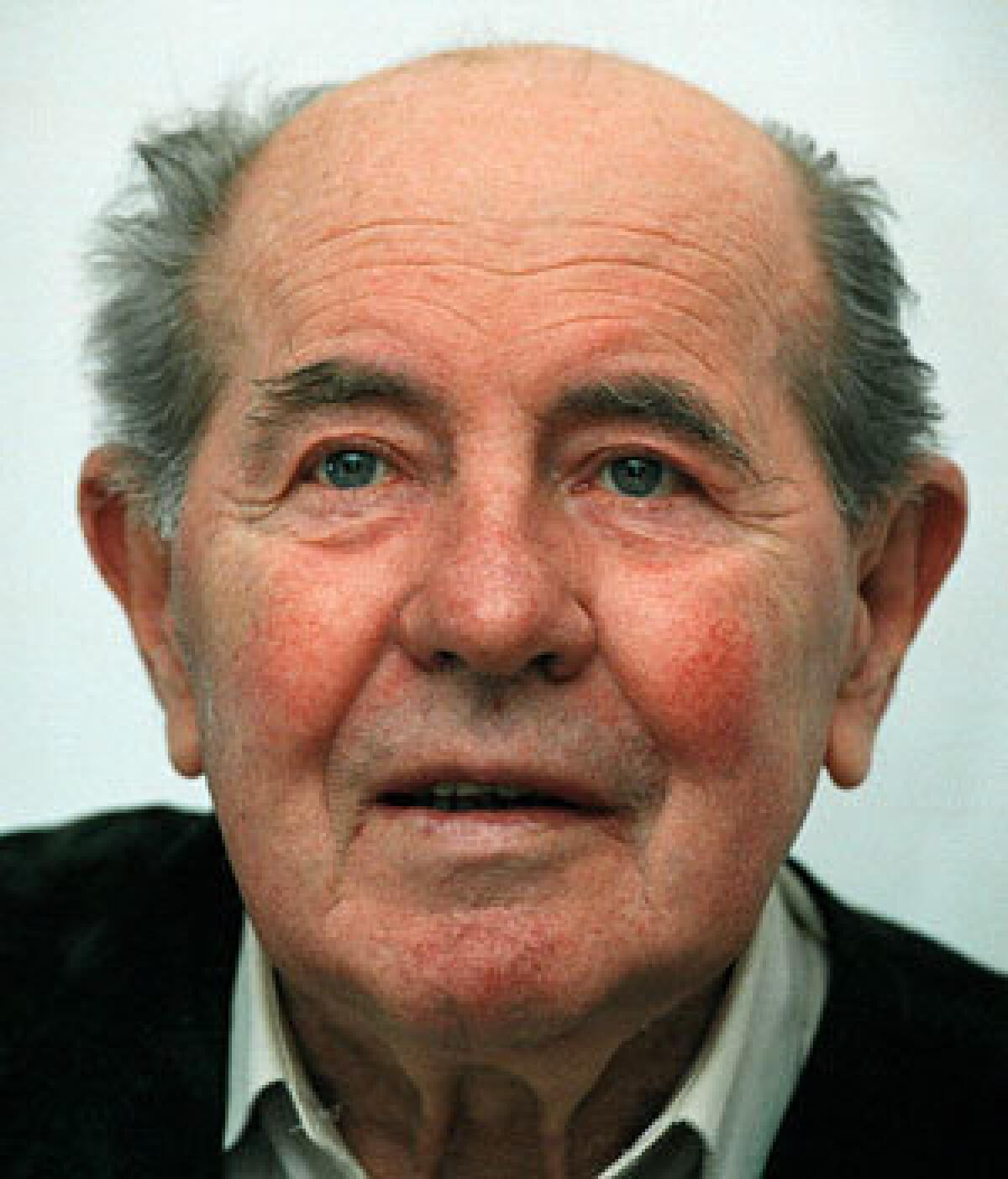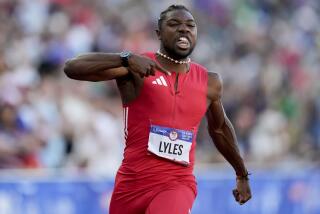Czech great Zatopek dies after stroke

- Share via
Emil Zatopek, the great Czech runner who won the 5,000 and 10,000 meters and the marathon within an eight-day period during the 1952 Summer Olympics, died Tuesday in Prague at 78, about a month after suffering a stroke.
His triple-gold-medal performance at Helsinki, still unmatched in those grueling distance events, placed him on a pedestal at the time alongside other track and field icons such as Paavo Nurmi and Jesse Owens.
After winning the 10,000 meters on July 20, he was asked why he was entering the 5,000 a mere four days later.
“The marathon contest won’t be for a long time yet,” he said, “so I simply must do something until then.”
While Zatopek was making history at those Games, his wife, Dana, won a gold medal in the javelin throw. Mourners in Prague, where Zatopek died at a military hospital, consoled her Wednesday. They were married for 52 years and shared a Sept. 19, 1922 birth date.
England’s Roger Bannister, who broke track’s four-minute mile barrier in 1954, once called Zatopek “the greatest athlete of the post-World War II era.”
Zatopek, then 29, returned home from Helsinki to a hero’s welcome. He was promoted to lieutenant-colonel in the Czechoslovakian army and given a prominent position in the Communist Party.
He was not a communist at heart, though, and was expelled from the army and the party for signing the 2000 Words Manifesto in 1968 that was critical of the Soviet Union’s influence over Czechoslovakia.
He was assigned to manual labor at a uranium mine, then demoted further to driving a sprinkler truck for the Prague sanitation department. After seven years, the sports ministry, taking advantage of his facility with languages, gave him a job as a “sports spy,” translating books and articles for training tips from foreign coaches. He remained in that job until his retirement in 1982.
He was celebrated again as a national treasure after the Velvet Revolution in 1989 that severed the country’s ties to the Soviet Union, and, on Wednesday, Czech Republic President Vaclav Havel sent a message to Zatopek’s widow saying, “We will always remember . . . not only his human qualities and natural modesty, but also the fact you were a lifetime support to him.”
In 1975, Zatopek was awarded the United Nations’ Pierre de Coubertin Prize for promoting fair play.
Nicknamed “The Engine,” he is as well remembered for his compelling running style as for his Olympic victories and 18 world records. He staggered, moaned and gasped--and almost always won.
He ran with the facial expressions of a man undergoing torture. His head lolled about, from side to side and back to front, his face contorted in a series of pained, eyes-shut expressions.
Famed sportswriter Red Smith once described his style as, “Bobbing, weaving, staggering, gyrating, clutching his torso, flinging supplicating glances toward the heavens, he runs like a man with a noose around his neck.”
Said Olympic filmmaker Bud Greenspan: “He was a charming, charming man who was very American-oriented. He loved cowboy hats and he could sing ‘Home on the Range.’ ”
As a 25-year-old Czech Army lieutenant in 1948, Zatopek won his first Olympic championship in London by running away with the 10,000 meters by more than 300 meters. He lapped all but two runners, winning in an Olympic-record time of 29 minutes 59.6 seconds.
Only two years earlier, Zatopek had ridden a bicycle from Prague to Berlin to compete in his first international race, which he won.
Days after winning the 10,000 at London, Zatopek won the silver medal in the 5,000, losing by a half-meter. Belgium’s Gaston Reiff had a 50-meter lead at the gun lap, but Zatopek unleashed a furious sprint on a rain-soaked track that fell just short.
“He was too far off the pace, almost three-quarters of a lap near the end, when he went off like a bat out of hell and lost by a stride,” Greenspan said.
In 1952, in Helsinki, Zatopek became the first athlete since 1912 to win both the 10,000 and 5,000. Then he added a marathon gold medal.
Again, he won the 10,000 easily, by about 100 meters. He broke his Olympic record by more than 43 seconds.
He achieved his most thrilling Olympic victory in the Helsinki 5,000. Trailing three other runners on the final turn, the grimacing, groaning Zatopek swung wide and passed them all, breaking another Olympic record and winning by five meters.
Later that afternoon, Zatopek was informed that his wife had won the gold medal in the javelin throw. He was also asked if he still intended to enter the marathon, which was six days away.
“The result of this race [the 5,000] is too close,” he said. “To restore some prestige, I will try to improve on it in the marathon.”
Incredibly, in his first marathon, he won with another Olympic record, 2:23.03.2.
The favorite, England’s Jim Peters, had run the world’s fastest marathon six weeks earlier. According to David Wallechinsky’s “Complete Book of the Summer Olympics,” Zatopek, seeking to benefit from Peters’ experience, caught up with him 15 kilometers into the race and asked, in English, about the pace.
“Pace too slow,” said an already tiring Peters, believing he could trick Zatopek into burning himself out.
Zatopek considered that for a while, then sped off. Peters, in trying to keep up with Zatopek, developed a leg cramp at 20 miles and dropped out.
By the time runner-up Reinaldo Gorno of Argentina entered the stadium, Zatopek was already in his sweats, signing autographs.
He entered the Olympic marathon in Melbourne in 1956 and finished sixth.
When asked once why he ran with such facial and body contortions, he replied: “I was not talented enough to run and smile at the same time.”
Times wire services contributed to this report.
More to Read
Sign up for Essential California
The most important California stories and recommendations in your inbox every morning.
You may occasionally receive promotional content from the Los Angeles Times.













